
The 1999 New Zealand general election was held on 27 November 1999 to determine the composition of the 46th New Zealand Parliament. The governing National Party, led by Prime Minister Jenny Shipley, was defeated, being replaced by a coalition of Helen Clark's Labour Party and the smaller Alliance. This marked an end to nine years of the Fourth National Government, and the beginning of the Fifth Labour Government which would govern for nine years in turn, until its loss to the National Party in the 2008 general election. It was the first New Zealand election where both major parties had female leaders.
Te Pāti Māori, also known as the Māori Party, is a political party in New Zealand advocating Māori rights. With the exception of a handful of general electorates, Te Pāti Māori contests the reserved Māori electorates, in which its main rival is the Labour Party.
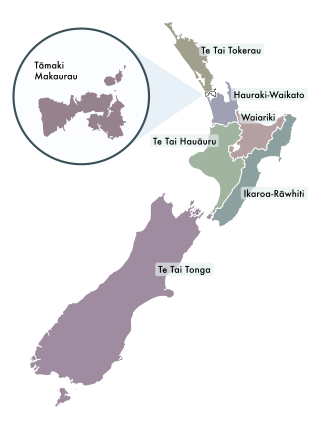
In New Zealand politics, Māori electorates, colloquially known as the Māori seats, are a special category of electorate that give reserved positions to representatives of Māori in the New Zealand Parliament. Every area in New Zealand is covered by both a general and a Māori electorate; as of 2020, there are seven Māori electorates. Since 1967, candidates in Māori electorates have not needed to be Māori themselves, but to register as a voter in the Māori electorates people need to declare that they are of Māori descent.

Parekura Tureia Horomia was a New Zealand Labour Party politician who served as Minister of Māori Affairs between 2000 and 2008.

Māori politics is the politics of the Māori people, who were the original inhabitants of New Zealand and who are now the country's largest minority.
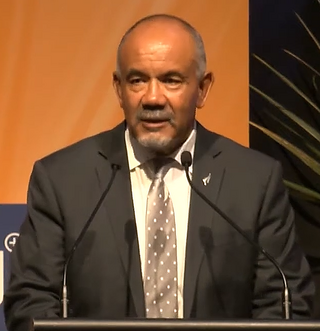
Te Ururoa James William Ben Flavell, also known as Hemi Flavell, is a New Zealand politician who was a co-leader of the Māori Party from 2013 until 2018 and represented the Waiariki electorate for the party in Parliament from 2005 to 2017.

Te Tai Tonga is a New Zealand parliamentary Māori electorate, returning one Member of Parliament to the New Zealand House of Representatives. It was established for the 1996 general election, replacing Southern Maori. It covers all of the South Island, Stewart Island, the Chatham Islands, and parts of both Wellington City and the Hutt Valley. The current MP for Te Tai Tonga is Tākuta Ferris of Te Pāti Māori.

Waiariki is a New Zealand parliamentary Māori electorate that was established for the 1999 election, replacing the Te Tai Rawhiti electorate. It is currently held by Te Pāti Māori co-leader Rawiri Waititi, who won it in the 2020 and 2023 general elections.
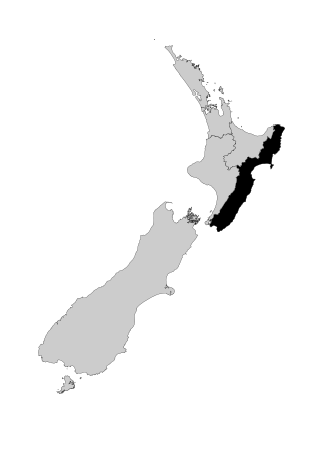
Ikaroa-Rāwhiti is a New Zealand parliamentary Māori electorate that was formed for the 1999 election. It covers the eastern North Island from East Cape south through Hawke's Bay and the Wairarapa to Wainuiomata and most of the Hutt Valley, but not southern Lower Hutt or Wellington City.
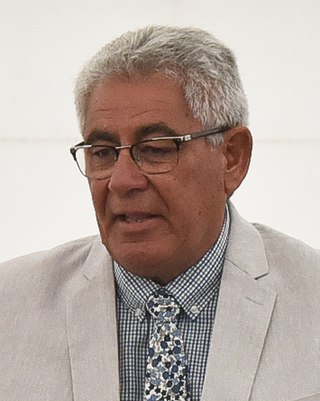
Derek Tinia Fox is a New Zealand broadcaster, commentator, publisher, journalist and Māori Party candidate in several elections. He was the Mayor of Wairoa from 1995 to 2001.
Te Tai Rawhiti was one of the five new New Zealand parliamentary Māori electorates created in 1996 for MMP. It largely replaced its English-named predecessor, Eastern Maori, though Te Tai Rawhiti's boundary was retracted significantly in the central North Island.

The 50th New Zealand Parliament was elected at the 2011 general election. It had 121 members, and was in place from December 2011 until September 2014, followed by the 2014 general election. The first sitting of the 50th Parliament was held on 20 December 2011, where members were sworn in and Lockwood Smith was elected Speaker of the House. This was followed by the speech from the throne on 21 December. John Key continued to lead the Fifth National Government. Following the resignation of Smith, David Carter was elected Speaker.
The Mana Movement, originally known as the Mana Party, was a political party in New Zealand. The party was led by Hone Harawira who formed it in April 2011 following his resignation from the Māori Party. Harawira won the by-election in Te Tai Tokerau of 25 June 2011 for the Mana Party and retained the seat during the 2011 general election in November.

Melissa Heni Mekameka Whaitiri is a New Zealand politician and former member of the New Zealand House of Representatives. She was first elected to Parliament in the 2013 Ikaroa-Rāwhiti by-election for the Labour Party.

Marama Kahu Fox is a former New Zealand politician who was elected to the New Zealand parliament at the 2014 general election as a representative of the Māori Party. Following her election to parliament, she was named Māori Party co-leader alongside Te Ururoa Flavell, replacing party founder Tariana Turia.

A by-election was held in the Northland electorate on 28 March 2015. The seat had been vacated following the resignation of Mike Sabin of the National Party from the House of Representatives on 30 January 2015. Northland was generally regarded as a safe National seat; the party has held the seat since its creation for the 1996 election. The election was won by Winston Peters of New Zealand First. As Peters was already a list MP for his party, this allowed New Zealand First an additional list member, Ria Bond, to join parliament.
This page lists candidates contesting electorates in the 2020 New Zealand general election.

Debbie Anne Ngarewa-Packer is a New Zealand politician, iwi leader and activist. She is a Member of Parliament and co-leader of Te Pāti Māori alongside Rawiri Waititi, and is the chief executive of the Ngāti Ruanui iwi.
This page lists candidates contesting electorates in the 2023 New Zealand general election.
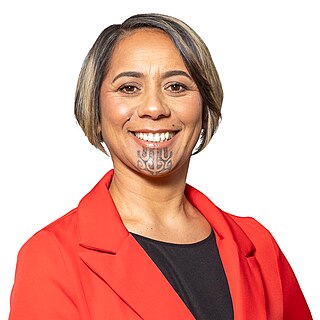
Cushla Tangaere-Manuel is a New Zealand politician and Member of Parliament in the House of Representatives for the Labour Party. She represents the Ikaroa-Rāwhiti electorate and was first elected at the 2023 general election. Prior to entering parliament, Tangaere-Manuel worked as a broadcaster for TVNZ and Whakaata Māori, and as a sports administrator.


















